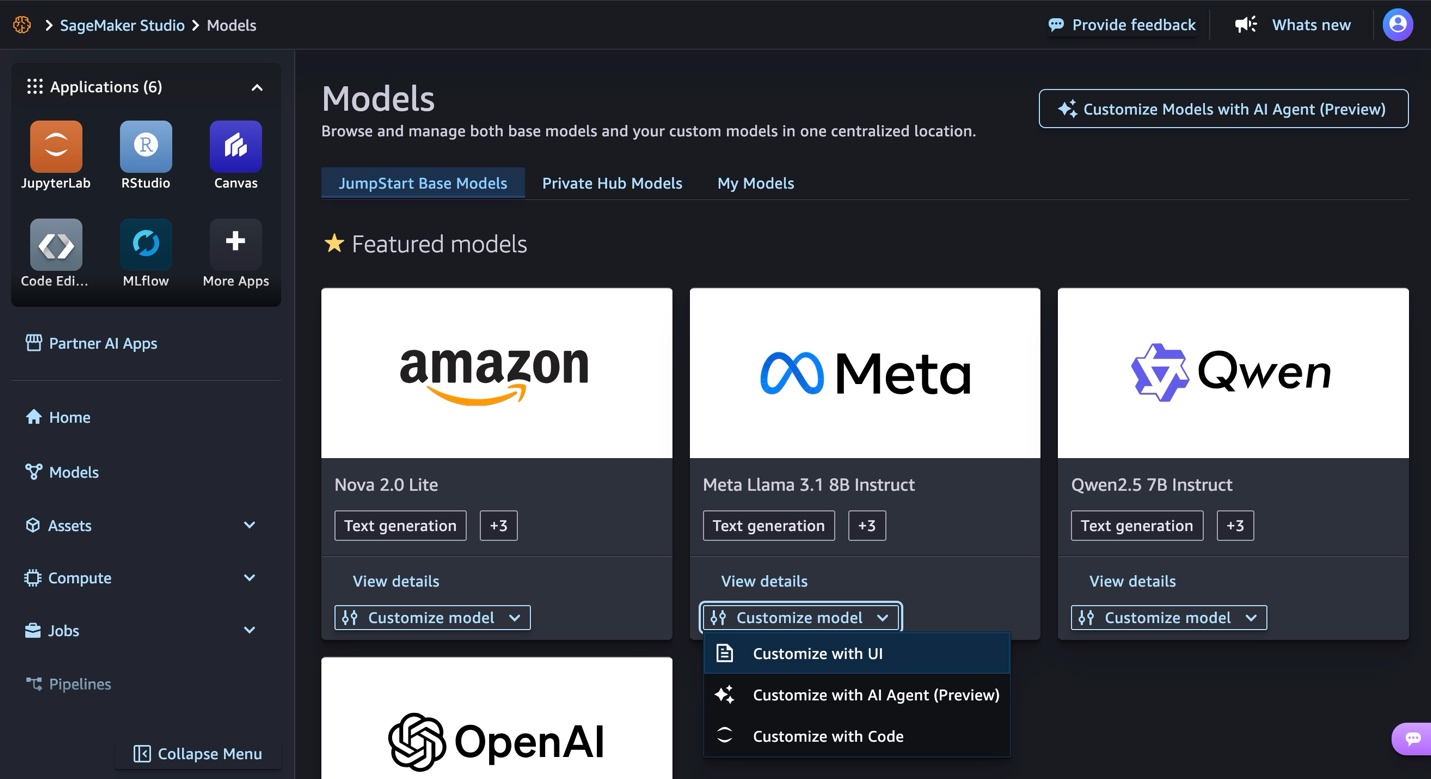This blog post is co-written with Louis Prensky and Philip Kang from Appian.
The digital transformation wave has compelled enterprises to seek innovative solutions to streamline operations, enhance efficiency, and maintain a competitive edge. Recognizing the growing complexity of business processes and the increasing demand for automation, the integration of generative AI skills into environments has become essential. This strategic move addresses key challenges such as managing vast amounts of unstructured data, adhering to regulatory compliance, and automating repetitive tasks to boost productivity. Using robust infrastructure and advanced language models, these AI-driven tools enhance decision-making by providing valuable insights, improving operational efficiency by automating routine tasks, and helping with data privacy through built-in detection and management of sensitive information. For enterprises, this means achieving higher levels of operational excellence, significant cost savings, and scalable solutions that adapt to business growth. For customers, it translates to improved service quality, enhanced data protection, and a more dynamic, responsive service, ultimately driving better experiences and satisfaction.
Appian has led the charge by offering generative AI skills powered by a collaboration with Amazon Bedrock and Anthropic’s Claude large language models (LLMs). This partnership allows organizations to:
Enhance decision making with valuable insights
Improve operational efficiency by automating tasks
Help protect data privacy through built-in detection and management of sensitive information
Maintain compliance with HIPAA and FedRAMP compliant AI skills
Critically, by placing AI in the context of a wider environment, organizations can operationalize AI in processes that seamlessly integrate with existing software, pass work between digital workers and humans, and help achieve strong security and compliance.
Background
Appian, an AWS Partner with competencies in financial services, healthcare, and life sciences, is a leading provider of low-code automation software to streamline and optimize complex business processes for enterprises. The Appian AI Process Platform includes everything you need to design, automate, and optimize even the most complex processes, from start to finish. The world’s most innovative organizations trust Appian to improve their workflows, unify data, and optimize operations—resulting in accelerated growth and superior customer experiences.
Amazon Bedrock is a fully managed service that offers a choice of high-performing foundation models (FMs) from leading AI companies such as AI21 Labs, Anthropic, Cohere, Meta, Mistral AI, Stability AI, and Amazon through a single API, along with a broad set of capabilities you need to build generative AI applications with security, privacy, and responsible AI.
Appian uses the robust infrastructure of Amazon Bedrock and Anthropic’s Claude LLMs to offer fully integrated, pre-built generative AI skills that help developers enhance and automate business processes using low-code development. These use case-driven tools automate common tasks in business processes, making AI-powered applications faster and easier to develop.
This blog post will cover how Appian AI skills build automation into organizations’ mission-critical processes to improve operational excellence, reduce costs, and build scalable solutions. Additionally, we’ll cover real-world examples of processes such as:
A mortgage lender that used AI-driven data extraction to reduce mortgage processing times from 16 weeks to 10 weeks.
A financial services company that achieved a four-fold reduction in data extraction time from trade-related emails.
A legal institution that used AI to reduce attorney time spent on contract review, enabling them to focus on other, high-value work.
Current challenges faced by enterprises
Modern enterprises face numerous challenges, including:
Managing vast amounts of unstructured data: Enterprises deal with immense volumes of data generated from various sources such as emails, documents, and customer interactions. Organizing, analyzing, and extracting valuable insights from unstructured data can be overwhelming without advanced AI capabilities.
Help protect data privacy and compliance: With increasing regulatory requirements around data privacy and protection, organizations must safeguard sensitive information, such as personally identifiable information (PII). Manual processes for data redaction and compliance checks are often error-prone and resource-intensive.
Streamlining repetitive and time-consuming tasks: Routine tasks such as data entry, document processing, and content classification consume significant time and effort. Automating these tasks can lead to substantial productivity gains and allow employees to focus on more strategic activities.
Adapting to rapidly changing market conditions: In a fast-paced business environment, organizations need to be agile and responsive. This requires real-time data analysis and decision-making capabilities that traditional systems might not provide. AI helps businesses quickly adapt to industry changes and customer demands.
Enhancing decision-making with accurate data insights: Making informed decisions requires access to accurate and timely data. However, extracting meaningful insights from large datasets can be challenging without advanced analytical tools. AI-powered solutions can process and analyze data at scale, providing valuable insights that drive better decision-making.
Appian AI service architecture
The architecture of the generative AI skills integrates both the Amazon Bedrock and Amazon Textract scalable infrastructure with Appian’s process management capabilities. This generative AI architecture is designed with private AI as the foundation and upholds those principles.
If a customer site isn’t located in an AWS Region that supports a feature, customers can send their data to a supported Region, as shown in the following figure.
The key components of this architecture include:
Appian AI Process Platform instances: The frontend serves as the primary application environment where users interact with the system application to upload documents, initiate workflows, and view processed results.
Appian AI service: This service functions as an intermediary layer between the Appian instances and AWS AI services (Amazon Textract and Amazon Bedrock). This layer encapsulates the logic required to interact with the AWS AI services to manage API calls, data formatting, and error handling.
Amazon Textract: This AWS service is used to automate the extraction of text and structured data from scanned documents and images and provide the extracted data in a structured format.
Amazon Bedrock: This AWS service provides advanced AI capabilities using FMs for tasks such as text summarization, sentiment analysis, and natural language understanding. This helps enhance the extracted data with deeper insights and contextual understanding.
Solution
Appian generative AI skills, powered by Amazon Bedrock with Anthropic’s Claude family of LLMs, are designed to jump-start the use of generative AI in your processes. The following figure showcases the diverse capabilities of Appian’s generative AI skills, demonstrating how they enable enterprises to seamlessly automate complex tasks.
Selecting an AI skill
Editing an AI skill
Each new skill provides a pre-populated prompt template tailored to specific tasks, alleviating the need to start from scratch. Businesses can select the desired action and customize the prompt for a perfect fit, enabling the automation of tasks such as:
Content analysis and processing: With Appian’s generative AI skills, businesses can automatically generate, summarize, and classify content across various formats. This capability is particularly useful for managing large volumes of customer feedback, generating reports, and creating content summaries, significantly reducing the time and effort required for manual content processing.
Text and data extraction: Organizations generate mountains of data and documents. Extracting this information manually can be both burdensome and error-prone. Appian’s AI skills can perform highly accurate text extraction from PDF files and scanned images and pull relevant data from both structured and unstructured data sources such as invoices, forms, and emails. This speeds up data processing and promotes higher accuracy and consistency.
PII extraction and redaction: Identifying and managing PII within large datasets is crucial for data governance and compliance. Appian’s AI skills can automatically identify and extract sensitive information from documents and communication channels. Additionally, Appian supports plugins that can redact this content for further privacy. This assists your compliance efforts without extensive manual intervention.
Document summarization: Appian’s AI skills can summarize documents to give users an overview before digging into the details. Whether it’s summarizing research papers, legal documents, or internal reports, AI can generate concise summaries, saving time and making sure that critical information is highlighted for quick review.
The following figure shows an example of a prompt-builder skill used to extract unstructured data from a bond certificate.
Each AI skill offers pre-populated prompt templates, allowing you to deploy AI without starting from scratch. Each template caters to specific business needs, making implementation straightforward and efficient. Plus, users can customize these prompts to fit their unique requirements and operational needs.
Key takeaways
In this solution, Appian Cloud seamlessly integrates and customizes Amazon Bedrock and Claude LLMs behind the scenes, abstracting complexity to deliver enterprise-grade AI capabilities tailored to its cloud environment. It provides pre-built, use case specific prompt templates for tasks like text summarization and data extractions, dynamically customized based on user inputs and business context. Using the scalability of the Amazon Bedrock infrastructure, Appian Cloud provides optimal performance and efficient handling of enterprise-scale workflows, all within a fully managed cloud service.
By addressing these complexities, Appian Cloud empowers businesses to focus solely on using AI to achieve operational excellence and business outcomes without the burdens of technical setup, integration challenges, or ongoing maintenance efforts.
Customer success stories
Appian’s AI skills have proven effective across multiple industries. Here are a few real-world examples:
Mortgage processing: This organization automated the extraction of over 60 data fields from inconsistent document formats, reducing the process timeline from 16 weeks to 10 weeks and achieving 98.33% accuracy. The implementation of Appian’s generative AI skills allowed the mortgage processor to streamline their workflow, significantly cutting down on processing time and improving data accuracy, which led to faster loan approvals and increased customer satisfaction.
Financial services: A financial service company received over 1,000 loosely structured emails about trades. Manually annotating these emails led to significant human errors. With an Appian generative AI skill, the customer revamped the entity tagging process by automatically extracting approximately 40 data fields from unstructured emails. This resulted in a four-fold reduction in extraction time and achieved over 95% accuracy, improving the user experience compared to traditional ML extraction tools. The automated process not only reduced errors but also enhanced the speed and reliability of data extraction, leading to more accurate and timely trading decisions.
Legal review: A legal institution had to review negotiated contracts against the original contracts to determine whether the outlined risks had been resolved. This manual process was error prone and labor intensive. By deploying a generative AI skill, they automated the extraction of changes between contracts to find the differences and whether risks had been resolved. This streamlined the attorney review process and provided insights and reasoning into the differences found. The automated solution significantly reduced the time attorneys spent on contract review, allowing them to focus on more strategic tasks and improving the overall efficiency of the legal department.
Conclusion
AWS and Appian’s collaboration marks a significant advancement in business process automation. By using the power of Amazon Bedrock and Anthropic’s Claude models, Appian empowers enterprises to optimize and automate processes for greater efficiency and effectiveness. This partnership sets a new standard for AI-driven business solutions, leading to greater growth and enhanced customer experiences. The ability to quickly deploy and customize AI skills allows businesses to stay agile and responsive in a dynamic environment.
Appian solutions are available as software as a service (SaaS) offerings in AWS Marketplace. Check out the Appian website to learn more about how to use the AI skills.
About the Authors
Sunil Bemarkar is a Senior Partner Solutions Architect at Amazon Web Services. He works with various Independent Software Vendors (ISVs) and Strategic customers across industries to accelerate their digital transformation journey and cloud adoption.
John Klacynski is a Principal Customer Solution Manager within the AWS Independent Software Vendor (ISV) team. In this role, he programmatically helps ISV customers adopt AWS technologies and services to reach their business goals more quickly.
Louis Prensky is a Senior Product Manager at Appian. He is responsible for driving product strategy and feature design for AI Skills within Appian’s Cognitive Automation Group.
Philip Kang is a Principal Solutions Consultant in Partner Technology & Innovation centers with Appian. In this role, he spearheads technical innovation with a focus on AI/ML and cloud solutions.



